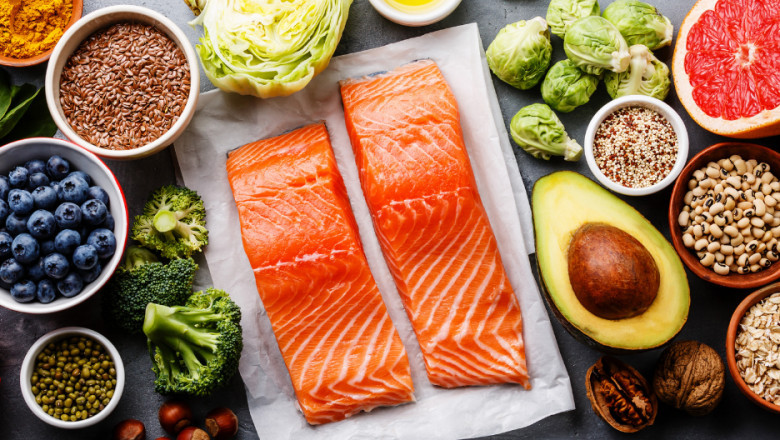views

Chronic inflammation is linked to numerous diseases such as heart disease, arthritis, diabetes, and even cancer. While inflammation is a natural part of the immune response, prolonged inflammation can be harmful. Fortunately, one of the most powerful tools against inflammation comes not from the pharmacy, but from your plate. Certain foods have natural anti-inflammatory properties and can help reduce or prevent long-term inflammation in the body.
Here’s a comprehensive list of the 25 best anti-inflammatory foods you can eat every day to support your overall health.
🥑 1. Avocados
Avocados are rich in healthy monounsaturated fats, fiber, and potassium. They also contain tocopherols and carotenoids, which are linked to reduced cancer risk and anti-inflammatory effects.
How to Eat: Add to salads, smoothies, or enjoy as guacamole.
🫐 2. Blueberries
Packed with antioxidants like anthocyanins, blueberries help fight oxidative stress and inflammation.
How to Eat: Add to oatmeal, yogurt, or enjoy as a snack.
🐟 3. Fatty Fish (Salmon, Sardines, Mackerel)
These are high in omega-3 fatty acids (EPA and DHA), which have well-documented anti-inflammatory effects.
How to Eat: Grill, bake, or enjoy canned with olive oil.
🌰 4. Walnuts
Walnuts are loaded with omega-3s and polyphenols that help calm inflammation.
How to Eat: Add to oatmeal, salads, or snack on a handful.
🫒 5. Extra Virgin Olive Oil
A cornerstone of the Mediterranean diet, olive oil contains oleocanthal, a compound with similar anti-inflammatory effects as ibuprofen.
How to Use: Drizzle over salads, vegetables, or use in cooking.
🍵 6. Green Tea
Green tea contains catechins, especially EGCG, which have powerful antioxidant and anti-inflammatory properties.
How to Drink: 1–2 cups a day, hot or iced.
🥦 7. Broccoli
Broccoli is high in sulforaphane, an antioxidant that fights inflammation by reducing cytokines.
How to Eat: Steam, roast, or stir-fry.
🍠 8. Sweet Potatoes
These are rich in fiber, vitamins, and anti-inflammatory plant compounds like beta-carotene.
How to Eat: Roast or mash with herbs and spices.
🍓 9. Strawberries
Strawberries are high in antioxidants like vitamin C and anthocyanins that reduce inflammatory markers.
How to Eat: With yogurt, in smoothies, or fresh.
🌿 10. Turmeric
The active compound curcumin is a potent anti-inflammatory and antioxidant.
How to Use: Add to soups, smoothies, golden milk, or curry.
🍄 11. Mushrooms (Shiitake, Maitake, Reishi)
Certain mushrooms contain compounds that may reduce inflammation and boost immunity.
How to Eat: Sauté, add to stews, or stir-fry.
🥕 12. Carrots
Rich in beta-carotene and fiber, carrots help reduce inflammation and oxidative stress.
How to Eat: Raw, roasted, or in soups.
🌱 13. Spinach
Spinach is loaded with antioxidants, vitamin E, and other compounds that reduce inflammation.
How to Eat: Sauté, blend into smoothies, or eat raw in salads.
🧄 14. Garlic
Garlic contains sulfur compounds like allicin, which have been shown to reduce inflammation.
How to Use: Add minced garlic to dishes, or eat roasted.
🧅 15. Onions
Onions contain quercetin, a flavonoid with powerful anti-inflammatory and antioxidant effects.
How to Eat: Raw in salads, sautéed, or grilled.
🍇 16. Grapes (especially red/purple)
High in resveratrol, grapes can help reduce inflammatory markers and oxidative stress.
How to Eat: As a snack or in salads.
🍅 17. Tomatoes
Tomatoes are rich in lycopene, an antioxidant with anti-inflammatory properties, especially when cooked.
How to Eat: Fresh, roasted, or in sauces.
🫘 18. Beans (Lentils, Chickpeas, Black Beans)
High in fiber and antioxidants, beans reduce C-reactive protein (CRP), an inflammation marker.
How to Eat: Add to salads, soups, or stews.
🌶 19. Bell Peppers
Colorful bell peppers are packed with vitamin C and quercetin, both known to reduce inflammation.
How to Eat: Raw, roasted, or in stir-fries.
🍍 20. Pineapple
Contains bromelain, an enzyme with anti-inflammatory and digestive benefits.
How to Eat: Fresh or in smoothies.
🥜 21. Almonds
Almonds are rich in healthy fats, vitamin E, and fiber—great for reducing inflammation and oxidative stress.
How to Eat: A handful as a snack or sprinkled on salads.
🧃 22. Beets
Beets are high in betalains, anti-inflammatory pigments that support detox and heart health.
How to Eat: Roasted, juiced, or grated raw into salads.
🌻 23. Chia Seeds
Loaded with omega-3s, fiber, and antioxidants, chia seeds are inflammation-fighting powerhouses.
How to Eat: Add to smoothies, puddings, or yogurt.
🌰 24. Flaxseeds
High in lignans and omega-3s, flaxseeds help lower inflammatory markers and improve heart health.
How to Eat: Ground flax in oatmeal, smoothies, or baking.
🍌 25. Bananas
While not traditionally seen as anti-inflammatory, bananas help with gut health and reduce inflammation through their prebiotic fiber.
How to Eat: As a snack, in oatmeal, or smoothies.
✅ Final Tips for Eating Anti-Inflammatory Foods Daily:
-
Diversify your plate: Aim to include a mix of fruits, vegetables, whole grains, healthy fats, and lean proteins.
-
Avoid processed foods: Refined sugars, trans fats, and artificial additives promote inflammation.
-
Stay hydrated: Water helps flush toxins and maintain a healthy immune system.
-
Be consistent: Eating these foods regularly is more important than occasional consumption.
🌟 Conclusion
Eating anti-inflammatory foods daily is one of the most powerful steps you can take to protect your body against chronic diseases and promote long-term health. Whether it’s the omega-3s in salmon, the antioxidants in berries, or the healing powers of turmeric and garlic, nature offers a powerful toolkit to help you feel your best. Incorporate these 25 foods into your daily routine and take a proactive step toward a healthier, inflammation-free life.



![TrimIQ [Weight Loss Powder] – Why Nutritionists Are Recommending This Over Pills?](https://theconnectly.com/upload/media/posts/2025-06/13/trimiq-weight-loss-powder-why-nutritionists-are-recommending-this-over-pills_1749819087-s.jpg)








Comments
0 comment